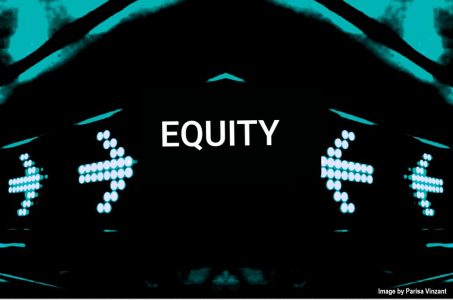Widgetized Section
Go to Admin » Appearance » Widgets » and move Gabfire Widget: Social into that MastheadOverlay zone
The Drive to Get Equity Done
The views expressed are those of the author and do not necessarily reflect the views of ASPA as an organization.
By Parisa Vinzant
February 18, 2020

What happens when the, “Need to get things done,” meets the urgency to do something to remedy inequity? How do we achieve meaningful and equitable change within this challenging environment?
In the nonprofit and public sectors, this kind of conflict in goals and values is commonplace as budgets dwindle and public administrators struggle to do more with fewer resources. According to the 2017 Administration & Society journal article by Mohamad Alkadry, Brandi Blessett and Valerie Patterson, this clash in values leads to a, “Culture of competition,” in which public servants are, “So focused on a need to produce results—to get things done—that they can overlook the unethical implications of their actions.” Whether public administrators are ignoring the ethical implications or merely choosing to prioritize the values of economy, efficiency and effectiveness, the result is the same: equity considerations are ignored. Yet, with minorities and other vulnerable members of society being disproportionately impacted by the ethic to, “Get things done,” there is an, “Ethical imperative,” to prioritize social equity considerations.
The values-based conflict between economy, efficiency and equity is not new, but exploring how cities are grappling with it is revealing. For example, in absence of leadership by a mayor or city manager to generate consensus for, and action on, equity, it is up to the public and community groups to organize and push for equity interventions to correct racial inequities that are causing disparities in health, economic and educational outcomes.
Imagine how this grassroots demand will be received in a city that has not yet altered how it views, incorporates or acts on equity. Likely, the status quo is maintained. However, in self-proclaimed progressive or demographically diverse cities, different outcomes are possible. In these cities, leadership may be open to considering equity and may already be pursuing specific equity initiatives. But if efficiency and economy still control the city’s decisionmaking and actions, these initiatives may fail. Unless a city explicitly takes a social and racial equity lens to evaluate and reboot its operating system—e.g., from how it handles budgeting and policy formulation to public engagement and program evaluation—any attempts at equitable change will likely be inadequate and even detrimental.
Cannabis social equity programs provide a clear example of this scenario in action. Cities and states both recognize that cannabis is an $8 billion industry with major tax revenue implications. As a result, officials are increasingly moving quickly to create cannabis programs, but social equity is often an afterthought. For example, California voters passed Proposition 64 to legalize recreational use of marijuana in 2016, but with implementation (e.g., cannabis ordinances) taking place at the local level, cannabis advocates and equity-in-cannabis activists are often leading the push to incorporate equity in these policies.
These programs represent a significant opportunity for all levels of government to address the war on drug’s devastating impact on black and minority communities. According to an ACLU analysis of marijuana possession arrests in the United States between 2001 and 2010, on average, black people were almost four times more likely to be arrested for pot than white people despite using marijuana at similar rates to whites. The disparities are worse in Iowa, D.C., Minnesota and Illinois—they run as high as 7.5 to 8.5 times greater.
Despite cannabis social equity programs having laudable social and racial justice goals, outcomes have fallen short. These programs are still relatively new, variable in structure, and most lack a key intervention: providing access to capital. Fundamentally, these programs do not address our country’s daunting wealth gap in which white household wealth is still 20 times that of blacks and Hispanics.
This wealth gap is complex with structural roots embedded in our country’s centuries-long enslavement, and subsequent discrimination, of blacks in all aspects of life (e.g., banking, housing, education, health and liberty). Accumulating generational and individual wealth is paramount, as it, “Provides a buffer of economic security against periods of unemployment or risk-taking, like starting a business.”
It is no wonder that only 4.3% of all United States cannabis businesses are owned by black individuals. Black cannabis business owners cite the lack of capital as a key barrier that social equity programs must address. Critics of these equity programs point to gaming by white weed entrepreneurs as another critical barrier for blacks in this business. In reality, these equity programs were ill fated from the start because social and racial equity factors—and especially the people most harmed by the war on drugs—were not at its core. The rush to get something done on equity enabled these programs to replicate the same shortcomings that we have seen before, and in the process, lock black communities out of cannabis ownership opportunities.
Cities are on the frontline of remedying inequities. To achieve substantive equity, cities will need to apply social and racial equity lenses in their processes, systems, decisionmaking, policies and programs. There are no easy answers or quick fixes, but this is not an impossible task. That is, if cities find the will to take up this necessary work.
Author: Parisa Vinzant is a consultant, MPA-seeking student (Biden School of Public Policy and Administration, University of Delaware), and technology/innovation commissioner in Long Beach, CA. Through her writing, Parisa seeks to apply a diversity, inclusion, ethics, and social/racial equity lens to such topics as democracy, technology, revitalizing the middle class, and community engagement. Contact her at [email protected] and @Parisa_Vinzant (Twitter).


Minch Lewis
February 21, 2020 at 3:58 pm
What can be learned from the 4.3% of successful black-owned cannabis businesses? How did they do it?